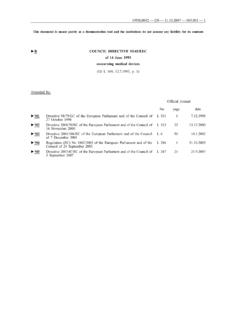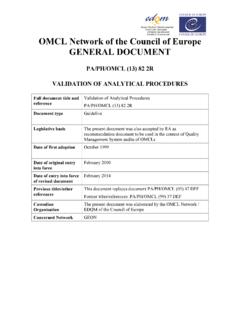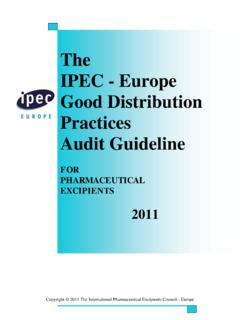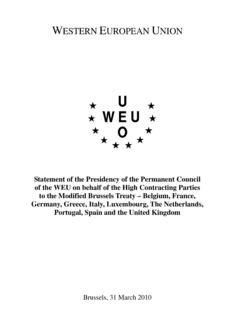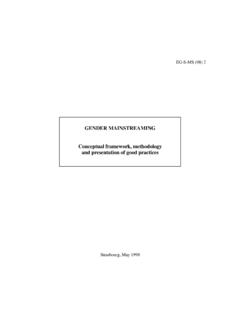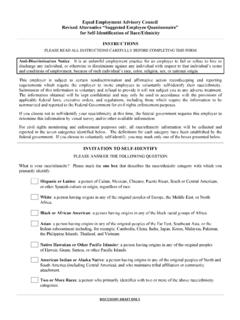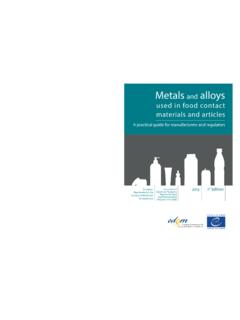Transcription of Guidelines for Due Diligence on Real Estate in the UK
1 Guidelines for Due Diligence on real Estate in the UKCommercial real Estate Finance Council europe CREFC europe DUE Diligence GUIDE Note: This guide considers due Diligence primarily in the context of a loan to be secured on United Kingdom real Estate . It may not be appropriate in connection with other types of asset, nor assets situated in other counties. The guide is designed as an overview only of the main issues the due Diligence should address. It is not exhaustive and cannot deal with the specifics of every property or transaction, which may require additional due Diligence beyond that contemplated within this document. Further, it does not deal in any depth with tax issues and reference should be made to the CREFC europe Tax Guide in this respect. CONTENTS Page A INTRODUCTION 3 B PURPOSE OF DUE Diligence 4 What is Due Diligence ?
2 4 Why undertake Due Diligence ? 4 Who should undertake Due Diligence ? 5 When should Due Diligence be undertaken? 6 Co-ordination of Due Diligence 6 C TRANSACTION DUE Diligence 7 Statutory requirements 7 Know Your Customer KYC 7 Money Laundering/Source of Funds 8 Borrower/Other parties 9 Legal structure/ownership 9 Legal power/capacity (legal opinions) 9 Tax 10 Asset 10 Inspection 10 Development/project appraisal 10 Management/advisory arrangements 11 Tenant credit analysis 12 Financial modelling (including funding/debt service) 19 2 10/10/2013 D ASSET DUE Diligence Primary reports (to be undertaken in most if not all cases) 24 Valuation 24 Legal certificate/report on title/property 27 Building/site/mechanical & electrical surveys 29 Measurement survey 30 Environment/ground survey 30 Additional reports (to be undertaken when circumstances require) 31 Planning (zoning)
3 31 Utilities (gas, electricity, telecommunications etc.) 32 Deleterious materials 32 Mining (coal, tin, lead, salt/brine, china clay etc.) 33 Unexploded Ordnance 33 Flooding 34 Occupational (health & safety) 34 Rights of Light 34 Infrastructure (railway, highway, waterways etc.) 35 Capital Allowances 35 Energy efficiency/performance 35 E INSURANCE ISSUES 36 Insurance Due Diligence 36 Legal Defects/Environmental Risk Insurance 38 F SUPPLEMENTARY ISSUES 40 Instruction Letters 40 Reliance 41 G DUE Diligence BEST PRACTICE PROTOCOL 42 3 10/10/2013 A INTRODUCTION Two years ago CREFC europe made a key decision. It recognised that one day the shadow of the Credit Crisis would start to dissipate and that it was important to be timely in addressing several fundamental aspects of the real Estate lending market. Firstly numerous and important object lessons had been provided as a result of the crisis that should not be lost or forgotten as the property and financial markets improved.
4 Secondly that the providers of debt in the future would not be exactly the same as the past; they would be a wider range of entities than simply banks and would represent a broader and probably more bespoke range of lending strategies. Finally the fall out of human capital meant that educational and training support to the industry may well be generally welcome. CREFC europe decided to address these aspects in a number of ways, one of which is building up a volume of thoughtful and rigorous work that offers best practice proposals for the complete value chain of property lending. Key areas of loan structuring, loan documentation, inter-creditor principles and hedging have all been addressed by specific releases. This paper now seeks to address the last key topic, namely due Diligence . In the years leading up to the Credit Crisis our industry did not distinguish itself in the extent and rigour of due Diligence undertaken.
5 Indeed the underlying principle of why we undertake such work was lost. Commercial property lending consumes vast amounts of capital and the impact of imprudent lending is usually very material for each individual lender and at the macro prudential level. We can have the most amazing and trusted client relationships but it remains incumbent on all lenders to retain a healthy degree of institutional scepticism on deal facts until they are allayed by professional experienced investigation. Every transaction has differences but there does remain a core Diligence process common to most. CREFC europe has sought to bring together a wide range of leading experts that will, in summarised form, collate their experience into a single body of work that clearly conveys a cohesive methodology. This paper will provide a starting point for each lender to consider its own individual approach to diligencing loans it wishes to enter into and, we hope, assist in some small way to generally improving the quality of the overall lending business, increasing regulatory trust in the approach we as an industry adopt and assist in the wider training of those that actively participate in that industry.
6 4 10/10/2013 B PURPOSE OF DUE Diligence What is due Diligence ? Due Diligence is the process of factual and legal investigation, research, analysis and discovery into the relevant borrower, asset, sponsor and other principal parties typically undertaken by a prospective buyer, lender or investor prior to entering into a transaction. The precise scope of the exercise will vary depending upon the nature and value of the transaction and/or asset, the lender s existing knowledge of the borrower, timing and cost considerations but, in the context of the acquisition of, investment in or loan secured on, United Kingdom real Estate , typically involves: an analysis of the buyer s/borrower s business plan, cost projections, appraisals and cash-flow forecasts with particular regard to the buyer s/borrower s ability to service the debt and repay the loan at maturity; a review of the buyer s/borrower s, solvency, funding and tax position, principal fiscal issues and other liabilities affecting the property, borrower or buyer.
7 Enquires into the background, experience and credit record of the buyer/borrower, sponsors and/or other principal parties (for a development property, this could extend to the contractors and professionals engaged and/or any ultimate buyer or tenant); a physical inspection of the property; a valuation of the property (and/or, in the case of a corporate purchase, the value of the shares in the property owning company); an investigation of/report on the title to the property and/or legal restrictions affecting its use, an analysis of any risks associated with owning the relevant property arising from a legal or structural perspective and an assessment of the likely impact of other creditors, tenants or other persons also having interests in or rights over the property; where property is let, a review of the stability of the rental income stream, the credit-worthiness of the occupational tenants, the terms of the occupational leases and insurance and asset management arrangements; a health check on the physical condition of the property and any buildings located on it, typically comprising reports on structural, measurement, planning and environmental risks; consideration of the principal insurances; an assessment of the impact of the transaction upon existing contractual arrangements or permits; consideration of the nature of the security to be granted and enforcement issues; and The purpose of requiring separate reports for different due Diligence areas is to ensure that the best quality advice is available.
8 Individual areas can be very specialised and necessitate particular training and expertise a buyer/lender/investor should therefore always satisfy itself that the professionals or persons responsible for these are competent and experienced in the area concerned. The credentials of any report provider can usually be checked with the report provider s relevant professional organisation or regulator. Why undertake due Diligence ? The main purposes of due Diligence are: to establish whether the relevant asset is sound for the purposes of investment or loan security; to verify information given, financial projections and/or assumptions as to the ownership, (value and condition of the property) made in connection with the company, asset or transaction generally; to identify any risks inherent in the transaction or asset and mitigate these where possible; 5 10/10/2013 to comply with applicable statutory or regulatory requirements; generally to assist the buyer, lender or investor in analysing the legal and, to the extent possible, factual issues associated with the relevant transaction, and deciding whether to proceed.
9 Issues arising during due Diligence frequently impact upon the viability of a transaction, the price paid for the property or other material terms. Who should undertake due Diligence ? Seller This involves identifying material issues which may influence a buyer s or lender s decision to invest or offer finance and collating documents and other information which a buyer, lender and/or their advisors are likely to require. Undertaking this at an early stage (even before marketing a property) will: assist in identifying specific facts or matters (for example certain defects in title) which the seller may be legally required to disclose; help the seller plan how and when to raise these with the buyer and put the seller in a better position to deal with questions raised during negotiations; enable the seller to decide what representations and warranties can be given and what qualifications to these are appropriate or necessary; and generally ensure that the transaction proceeds quickly and efficiently and reduce the risk of a material unexpected problem arising during the later stages.
10 Buyer Any buyer of real Estate should undertake due Diligence to: test the assumptions made about the proposed investment; analyse the risks associated with the proposed purchase; ascertain whether all necessary information has been provided and, in light of any issues raised during the course of the due Diligence process, what further enquiries or due Diligence is required; verify the accuracy of information provided (on the basis of which the decision to buy/invest is made); and determine any outstanding issues which may prevent the acquisition from proceeding, consents or permits required from statutory bodies or (for leasehold properties) landlords for the buyer to purchase, develop or charge. Further financial modelling and/or adjustments to the business plan may be required in light of matters arising. Once the process is underway, material points can be raised during the negotiations and appropriate provisions ( warranties) included in the transaction documents.

![Wheres the MEAF -CREFC.pptx [Read-Only]](/cache/preview/0/b/7/8/8/3/b/d/thumb-0b7883bdf2948f679b688f1757fe686f.jpg)



